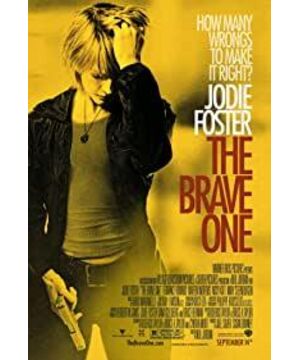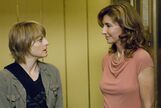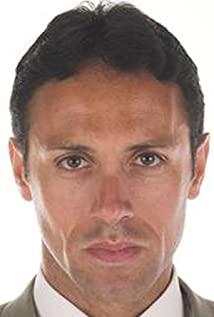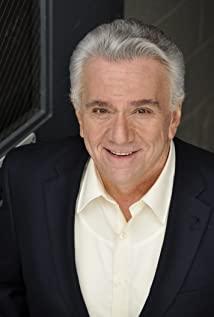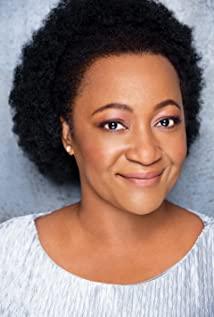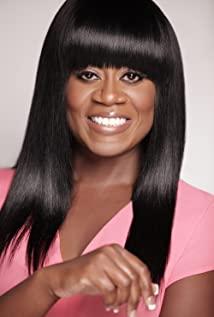You shouldn't smoke, it'll kill you.
ERICA
I don't care.
JOSAI
There's plenty of ways to die.But you have to figure out a way to live. Now that's hard.
See Brother Coen’s No Country for Old Men, after being fierce, faced a sad and tired ending, but Neil Jordan’s The Brave One was different. It was almost permeated by a sense of strength, which can make you tangled, and at the same time Jodie Foster injected it into it. A kind of flexible element, so that it will not lose control because of being too aggressive like some of Oliver Stone's works. In my evaluation, maybe people feel that this movie is moderate, but in reality it not only involves very sensitive topics, but also clearly gives my own answers.
In a sense, you can think of it as two movies, one is personal: a story about a woman injured in a violent crime being tortured by this tragedy and revenge, and the other involves big social issues. ——Or more should be regarded as an old ethical question: when the law symbolizing reason cannot be acted upon, should violence be used to curb violence?
Let’s look at the first theme first. This is explicit, and in fact it is the logic of the whole movie. In the first ten minutes or so, the taste of petty bourgeoisie is so strong that I feel a little disgusted-did Neil Jordan lose his own identity when he arrived in the United States? Is it vigorous? This kind of carelessness under psychological guidance made me overlook many very important details: for example, the gun shop in Chinatown where Erika bought the gun. The first time it appeared was in the photographs of Erika’s friends at the beginning, they even talked about it. Take this picture; for example, in Central Park, in the quiet moments before the tragedy, when Erika and David are warm, the other background sounds disappear, only the roar of the huge jet turbine engine (Thanks to Clarice), you remember What's up? Come on, this is New York! The hint is very vague, so when a tragedy happens, it can give you this feeling-there is no sign, just an ordinary walk in life, but it is so unfortunate. When the tragedy went on, the shoulder-mounted shooting and the interspersed dv in the film made the crime even more commonplace. Indeed, I read a book written by a New York forensic doctor n years ago and mentioned: If you want to commit suicide, you can kill yourself. After nightfall, walk alone in Central Park or go to Little Italy. It is this daily routine that makes people feel shocking, and that is why Erika will have a sense of fear after being discharged from the hospital with things that once felt ordinary and kind. This incident removed the gentle mask of the city. In fact, there is no sin. Everywhere, even if there is no extreme shock. The dirty and bloody rescue after the incident and the gentle love cut together, the contrast effect is very obvious. Here, the original balance is broken, and the resulting weightlessness cannot be filled, and the result of the criminal investigation is just endless waiting, which provides a good motivation for buying a gun—here she has not thought of revenge. It’s just for safety first, and for the second, I want to redeem the lost life. Then, there were four consecutive killings. The first time, she was forced. If she didn’t shoot, she might be killed. Her only problem was that she took the video tape-because she wanted to protect herself; the second time, in a sense , But also forced, but this time, the nature of her shooting is much more ambiguous, because she could have got off the car at the first few stops just like a few victims, and compared with the panic this time, She had to calm down a lot, every shot was hit; the third time, it can’t be said to be forced, because she could have rejected the rich old pervert, this time she was already semi-active and appeared as a protector. ; As for the time she killed the smuggler, she had already taken the initiative to attack the crime. In these four steps, she moved from self-protection to proactive attack, layer by layer. Her behavior can be seen as revenge or as a declaration of war. But even so, she is still the victimized woman, not the superhero played by Kate Anne Moss in soap operas such as comics or Dark Justice. She is still suffering—the pain at this time is twofold: Her pain as a victim did not go away-the middle section of the recounting plot echoed the beginning (again!) and put out the invitation card she ordered for the marriage again, so all the pain came back. This section is in the film. Few surreal scenes, separated by the symbolic yin and yang, on one side are the guitar bursts in memory, on the other side is the pain of the survivor; at the same time, the moral pressure brought by her new identity is even more compelling. ——She didn’t almost go Surrendered? At this time, as the police friend approached the truth at the right time, and the enemy came to the surface at the right time, all contradictions must be understood. These are all expected, but how to give a final answer has become a problem. I used to think that Erika’s revenge would succeed, but she was bound to die. What I didn’t expect was that she was cleverly dealt with in a four-to-two way. At first, I felt a little uncomfortable, but I looked back. Come to think about it, isn't death also a cliché? Moreover, this kind of treatment in front of me is the best way I can think of, giving this long-repressed movie a little bit playful, but when Erika finally had the courage to return to the place that changed her destiny in Central Park, the atmosphere of tragedy It is still very strong, she can get rid of the identity of the Avengers, but her past is still irretrievable, a daily accidental evil ruined her life-a Kieslovsky-style tragedy.
The other theme is concealed. Although many movies will mention violence against violence, what we see is mostly romantic like Batman and Sage Sage, which are really presented from a very realistic perspective, but there are not many. Sam Pai Kimpa’s "Straw Dog" can be counted as one, but it is also in a specific environment, and in this film, the scene in which the protagonist lives is the most common, precisely because of this premise, so It makes people feel more controversial. Various opinions have been reflected by the audience's phone calls in the film, but what about the creator's point of view? The ending has been given. Who said that we must be like the Hayes Code, good and bad people will eventually be punished by law, she is miserable enough, why let her die? Wasn't the people she killed villains? Has the law sanctioned those people? Why put a blazing angel next to a sinful body for burial? When I watched it, my feelings were also very complicated, especially when I was connected with the coexistence of fear and revenge after 9/11. Reason tells me that it cannot be so, otherwise you are like sinners. But what can it be? Waiting for the so-called late justice like a fool? Watching those villains get away with it? When the young Samuel Huntington shook his fist against the evil villains, what were the masochistic leftists doing? According to the evidence now available, it is clear that villains such as George Jackson and Huey Newton have been guilty of murder! God damn it! I think of a group of people who yelled at horses after the Ma Jiajue incident. I don't know what the family of the deceased would think when seeing these pseudo-saints. Yes, hatred cannot solve the problem, but these are facts, what should you do? To tolerate sin is a more shameful behavior than sin itself. Those who do not hesitate to punish sin at the risk of getting black are saints. Of course, those who enjoy 72 virgins cannot become saints-these words especially Said to the group of self-righteous French who persecute the paranoia seriously. Don't tell me anything about probation. Ninety percent of probation stories are psychotropic drugs made by third-rate magazines. This drug addiction will disappear after a personal pain. Even if there is a real probation, during the time that a villain was probated, another 10 innocent people will die at the hands of other villains. Even the most practical considerations will not believe this hypocritical argument.
Okay, the madness is over, and my rationality is restored. I admit that I was a little confused by this movie, and I was mixed with other thoughts, which made people unable to calm down. The macroscopic thinking was specific to the microscopic facts, and it was so weak.
View more about The Brave One reviews


